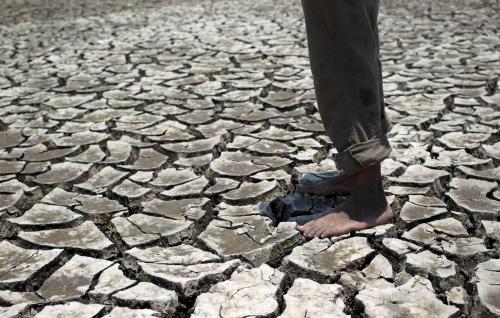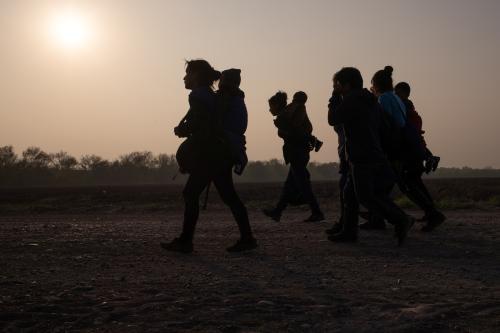INTRODUCTION
The importance of engaging directly with populations affected by poverty, conflict and disaster is a common theme in the literature on humanitarian aid, development and peacebuilding. The mandate to engage in consultation and participation with affected communities has been enshrined in, for example, UN Security Council Resolutions, UN agency manuals, international conventions, non-governmental organizations (NGOs) codes of conduct and guidelines, as well as the Guiding Principles on Internal Displacement. The Brookings-Bern Project on Internal Displacement’s own publications and the reports of the Representative of the UN Secretary-General on the Human Rights of Internally Displaced Persons also emphasize the need for governments and humanitarian actors to consult and engage directly with displaced populations.
In addition to the sound legal reasons to consult with IDPs, proponents of consultation and participation argue that these processes allow agencies[1] to gain local knowledge that is critical for good decision-making and to build on local capacities, benefiting affected populations and agencies themselves.[2]. Reasons for participation and consultation can be categorized as instrumental – focused on the way that consultation and participation can improve the relevance, quality, sustainability, timeliness and efficiency of support for affected populations – or value-oriented, focused on empowering and building capacity among the populations themselves.[3]
Yet despite the many documented benefits, consultation with and participation by affected populations – including IDPs – remains limited.[4] At best, IDP community leaders are consulted.[5] However, in a significant number of cases, IDPs are not even provided with complete and accurate information on decisions that are being made about their future.[6] While numerous publications expound on the importance of consulting with IDPs, good practices for how to do so are not well researched or understood.
[1] For the purposes of this paper, “agencies” refers to institutions and organizations providing support through activities and programs for displaced persons and other populations affected by conflict and disaster. “Agencies” may refer to government agencies, non-governmental organizations (NGOs), United Nations agencies or institutions such as development banks.
[2] Office of the Special Envoy for Tsunami Recovery/NGO Impact Initiative. NGO Impact Initiative: An Assessment by the International Humanitarian NGO Community (New York, October 2006), 9; ALNAP, Participation by Crisis-Affected Populations in Humanitarian Action: A Handbook for Practitioners (London: Overseas Development Institute, 2003); Department for International Development (DFID), Tools for Development – A Handbook for Those Engaged in Development Activity, Version 15.1 (March 2003); Asian Development Bank, Strengthening Participation for Development Results:
A Staff Guide to Consultation and Participation (April 2006); African Development Bank, Handbook on Stakeholder Consultation and Participation in ADB Operations, (2001).
[3] ALNAP, Participation by Crisis-Affected Populations in Humanitarian Action: A Handbook for Practitioners (draft) (Overseas Development Institute, London, 2003); all ALNAP case studies.
[4] ALNAP, Participation by Crisis-Affected Populations in Humanitarian Action: A Handbook for Practitioners (draft) (Overseas Development Institute, London, 2003); J. Borton et al., Support to Internally Displaced Persons – Learning from Evaluations, Synthesis Report of a Joint Evaluation Programme, commissioned by Danida, Development Cooperation Ireland, DFID, ECHO, Netherlands Ministry of Foreign Affairs, OCHA, Sida, UNHCR, WFP, USAID, 2005. http://www.reliefweb.int/library/documents/2005/sida-gen-28feb.pdf
[5] J. Borton et al. Support to Internally Displaced Persons – Learning from Evaluations, Synthesis Report of a Joint Evaluation Programme (2005).
[6] Oxfam America, “Forgotten Communities, Unmet Promises: An unfolding tragedy on the Gulf Coast,” (August 2006); I. Wall, “Where’s My House”? Improving communication with beneficiaries: an analysis of information flow to tsunami affected populations in Aceh Province, UNDP, based on research by the OCHA Public Information Working Group (UNDP, 2005); Office of the Special Envoy for Tsunami Recovery/NGO Impact Initiative. NGO Impact Initiative: An Assessment by the International Humanitarian NGO Community (New York, October 2006), 14, 35; International Medical Corps, “Displaced in America: Health Status Among Internally Displaced Persons in Louisiana and Mississippi Travel Trailer Parks: A Global Perspective,” (August 2006), 6.


